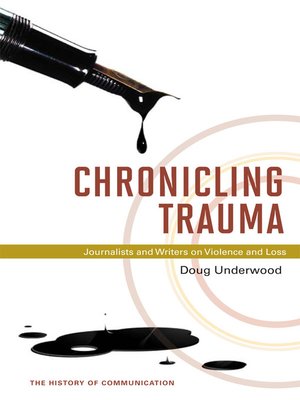Chronicling Trauma
ebook ∣ Journalists and Writers on Violence and Loss · The History of Media and Communication
By Doug Underwood

Sign up to save your library
With an OverDrive account, you can save your favorite libraries for at-a-glance information about availability. Find out more about OverDrive accounts.
Find this title in Libby, the library reading app by OverDrive.



Search for a digital library with this title
Title found at these libraries:
| Loading... |
To attract readers, journalists have long trafficked in the causes of trauma—crime, violence, warfare—as well as psychological profiling of deviance and aberrational personalities. Novelists, in turn, have explored these same subjects in developing their characters and by borrowing from their own traumatic life stories to shape the themes and psychological terrain of their fiction. In this book, Doug Underwood offers a conceptual and historical framework for comprehending the impact of trauma and violence in the careers and the writings of important journalist-literary figures in the United States and British Isles from the early 1700s to today.
Grounded in the latest research in the fields of trauma studies, literary biography, and the history of journalism, this study draws upon the lively and sometimes breathtaking accounts of popular writers such as Charles Dickens, Ernest Hemingway, Dorothy Parker, Graham Greene, and Truman Capote, exploring the role that trauma has played in shaping their literary works. Underwood notes that the influence of traumatic experience upon journalistic literature is being reshaped by a number of factors, including news media trends, the advance of the Internet, the changing nature of the journalism profession, the proliferation of psychoactive drugs, and journalists' greater self-awareness of the impact of trauma in their work.
The most extensive scholarly examination of the role that trauma has played in the shaping of our journalistic and literary heritage, Chronicling Trauma: Journalists and Writers on Violence and Loss discusses more than a hundred writers whose works have won them fame, even at the price of their health, their families, and their lives.
| Cover Title Page Copyright Page Contents Introduction. Trauma, News, and Narrative: The Study of Violence and Loss in Journalism and Fiction 1. Stories of Harm, Stories of Hazard: Childhood Stress and Professional Traumas in the Careers of J 2. Trafficking in Trauma: Women's Rights, Civil Rights, and Sensationalism as a Spur to Social Justi 3. Trauma in War, Trauma in Life: The Pose of the "Heroic" Battlefield Correspondent 4. Depression, Drink, and Dissipation: Dysfunctional Lifestyles and Art as the Ultimate Stimulant Epilogue: New Challenges, New Treatments: Trauma and the Contemporary Journalist-Literary Figure Appendix Notes Index |"Fascinating. . . . Will make you look at some of your favorite authors—from Twain to Hemingway, Dickens to Defoe—in a fresh light."—American Journalism"An intriguing, impressive, and original contribution that will inspire considerable thought about the history of journalism, the dynamic between a society's culture and its characteristic literature, and the impact of trauma on a writer's choice of literary subjects."—Nancy L. Roberts, coauthor of The Press and America: An Interpretive History of the Mass Media
"A beautifully interdisciplinary work that effortlessly combines psychology, literature, and journalism studies to carve out its own frontier. I have never seen a book on a similar topic that is so readable, accessible, and vast in scope as this one."—Jan Whitt, author of Women in American Journalism: A New History
|Doug Underwood is a professor of communication at the University of Washington. He is the author of four books, including From Yahweh to Yahoo!: The Religious Roots of the Secular Press.






